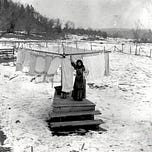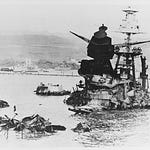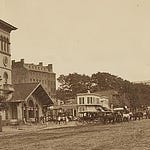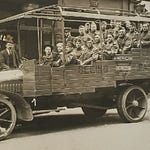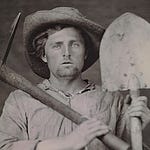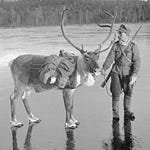To be for the common man.

It is August 31, 1910.
Theodore Roosevelt, the former president, has come to Osawatomie, Kansas, the birthplace of the Kansas Republican Party.

Osawatomie had been burned to the ground in 1856 in an attack waged by several hundred pro-slavery men against anti-slavery settlers.

Five men had died in the attack.
It had been a bitter preview of the civil war to come.

Roosevelt is touring the country after a year-long African safari.
In Osawatomie, he will dedicate a new town park commemorating the battle.

In his speech, Roosevelt will call for a ‘new American nationalism’ where people have an equal opportunity to compete on a level economic playing field.
It comes at a time when a few rich men control the levers of power.

‘In this environment, the common man cannot not rise to his own potential,’ Roosevelt will say, ‘and, as a result, the nation cannot achieve its own potential either.’

Roosevelt’s words in Osawatomie have been hailed since then as a powerful and concise statement of what it means to be a progressive.

From Roosevelt’s speech:1
“Our country--this great Republic-means nothing unless it means the triumph of a real democracy, the triumph of popular government,
“and, in the long run, of an economic system under which each man shall be guaranteed the opportunity to show the best that there is in him.

“In every wise struggle for human betterment one of the main objects, and often the only object,
“has been to achieve in large measure equality of opportunity.
“In the struggle for this great end, nations rise from barbarism to civilization,
“and through it people press forward from one stage of enlightenment to the next.

“One of the chief factors in progress is the destruction of special privilege.
“The essence of any struggle for healthy liberty has always been, and must always be,
“to take from some one man or class of men the right to enjoy power, or wealth, or position, or immunity, which has not been earned by service to his or their fellows.

“At many stages in the advance of humanity, this conflict
“between the men who possess more than they have earned and the men who have earned more than they possess
“is the central condition of progress.
“In our day it appears as the struggle of freemen to gain and hold the right of self-government as against the special interests,
“who twist the methods of free government into machinery for defeating the popular will.

“At every stage, and under all circumstances, the essence of the struggle is to equalize opportunity,
“destroy privilege,
“and give to the life and citizenship of every individual the highest possible value both to himself and to the commonwealth.

“Practical equality of opportunity for all citizens… [means that] every man will have a fair chance to make of himself all that in him lies;
“to reach the highest point to which his capacities… can carry him,
“and to get for himself and his family substantially what he has earned.”

Take it to heart.
Then and now, this is what it means to be a progressive.
******************************
I’ll see you tomorrow.
— Brenda
The speech has been abbreviated.


